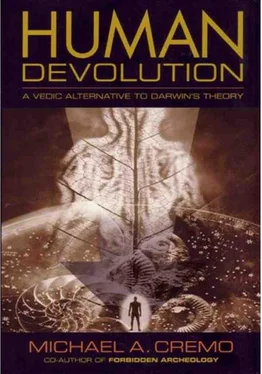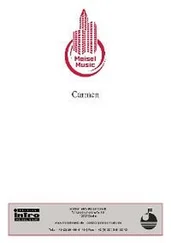Michael Cremo - Human Devolution - A Vedic Alternative To Darwin's Theory
Здесь есть возможность читать онлайн «Michael Cremo - Human Devolution - A Vedic Alternative To Darwin's Theory» весь текст электронной книги совершенно бесплатно (целиком полную версию без сокращений). В некоторых случаях можно слушать аудио, скачать через торрент в формате fb2 и присутствует краткое содержание. Год выпуска: 2003, ISBN: 2003, Издательство: Torchlight Publishing, Жанр: Старинная литература, на английском языке. Описание произведения, (предисловие) а так же отзывы посетителей доступны на портале библиотеки ЛибКат.
- Название:Human Devolution: A Vedic Alternative To Darwin's Theory
- Автор:
- Издательство:Torchlight Publishing
- Жанр:
- Год:2003
- ISBN:9780892133345
- Рейтинг книги:4 / 5. Голосов: 1
-
Избранное:Добавить в избранное
- Отзывы:
-
Ваша оценка:
- 80
- 1
- 2
- 3
- 4
- 5
Human Devolution: A Vedic Alternative To Darwin's Theory: краткое содержание, описание и аннотация
Предлагаем к чтению аннотацию, описание, краткое содержание или предисловие (зависит от того, что написал сам автор книги «Human Devolution: A Vedic Alternative To Darwin's Theory»). Если вы не нашли необходимую информацию о книге — напишите в комментариях, мы постараемся отыскать её.
Human Devolution: A Vedic Alternative To Darwin's Theory — читать онлайн бесплатно полную книгу (весь текст) целиком
Ниже представлен текст книги, разбитый по страницам. Система сохранения места последней прочитанной страницы, позволяет с удобством читать онлайн бесплатно книгу «Human Devolution: A Vedic Alternative To Darwin's Theory», без необходимости каждый раз заново искать на чём Вы остановились. Поставьте закладку, и сможете в любой момент перейти на страницу, на которой закончили чтение.
Интервал:
Закладка:
Newton, widely regarded as the father of modern science, is most known for his published works. But among his private papers are extensive manuscripts in which he reveals his commitment to the study of esoteric subjects connected with spiritual cosmologies. This caused Lord Keynes, in a paper published on the three hundredth anniversary of Newton’s birth, to call Newton “the last of the magicians” (Thorndike 1958, v. 8, p. 588). Newton’s unpublished writings contain hundreds of pages of notes on alchemy, including extracts from books by various authors as well as the results of Newton’s own experimental work on transmutation of metals, the philosopher’s stone, and the elixir of life. Newton also analyzed sacred writings such as Revelation in his search for the key to the mysteries of the universe. Lord Keynes noted, “The scope and character of these papers have been hushed up, or at least minimized, by nearly all those who have inspected them.” It was clear Newton had dedicated years of his life to these experiments and writings, which Lord Keynes characterized as “wholly magical” and “devoid of scientific value” (Thorndike 1958, v. 8, p. 590). I disagree with Lord Keynes’s latter remark. Newton’s unpublished writings are of immense scientific value because they remind us that the best scientific minds are willing to consider all the evidence available to human experience in their attempts to comprehend life and the universe.
Newton believed that the human body was pervaded by subtle animal spirits. He said that the motions of the bodies of animals and humans were produced by the soul causing the subtle spirit element to move through the nerves, which then caused the muscles to act (Thorndike 1958, v. 8, p. 595). In an appendix to the 1713 edition of his Principia, Newton suggested there might be an all-pervading subtle spirit that was the ultimate cause of gravity, electricity, light, and sensation. But he did not believe he had yet enough experimental evidence to give “an accurate determination and demonstration of the laws by which this electric and elastic Spirit operates” (Thorndike 1958, v. 8, pp. 595–596). Newton, in a famous letter to Richard Bentley, said that “Tis unconceivable that inanimate brute matter should (without the mediation of something else which is not material) operate upon and affect other matter without mutual contact” (Griffin 1997, p. 19).
Non-Western Cosmologies
I deliberately began this review of mystical cosmologies with examples from the history of science and philosophy in the West, from the time of classical antiquity to the beginning of the scientific revolution. My purpose was to show that the evidence for psychic phenomena gathered by prominent scientists of the nineteenth and twentieth centuries should not necessarily be seen as strange anomalies, outside the realm of science. Of course, such things would be anomalous in the context of a science with metaphysical commitments to a strict materialism. But they would find a place in a science with a different set of metaphysical commitments, a science with the same kind of metaphysical commitments maintained by Kepler and Newton, for example. Another purpose was to provide a context for the introduction of spiritual cosmologies from outside the Western sphere. By showing that elements of these cosmologies have a strong presence in Western science and philosophy, I hope to show that the spiritual cosmologies of the world’s great wisdom traditions are not alien to the intellectual tradition of the West.
276 Human Devolution: a vedic alternative to Darwin’s theory
Traditional Cosmology of China
The traditional wisdom of premodern China was a mixture of Buddhist, Confucianist, and Taoist elements, along with elements of a more primitive animism. The Taoist element was particularly influential. According to Taoism, the universe is pervaded by an order called Tao. The celestial aspect of this order (Tao T’ien) is revealed in the precise movements of the stars and planets. There is also a terrestrial aspect of the Tao revealed in the natural forces. But the original Tao existed before both of these manifestations of order. From this Tao come the principles of Yin, representing femininity, coldness, and darkness, and Yang, representing masculinity, warmth, and light (Day 1940, p. 56).
According to Day (1940, p. 165), the traditional Chinese cosmic hierarchy included many minor deities, such as the controller of small pox (Tou Shên), village patron protector (Chang Lao Hsiang Kung), spirit of wells (Tai Yi), and shop patron of prosperity (Kuan Kung). The Chinese also believed that they were surrounded by evil spirits ( kuei ) of many kinds. Latourette (1934, p. 163) reported: “On occasion they may take the forms of animals or even of men and women. A kuei may be in a maneating tiger. Great numbers of stories are told of animals— kuei —who can take at will the body of a man or especially of a beautiful woman and in that guise work harm. Kuei may be in old trees, or in clothes, in objects of furniture, or in mountains or stones. Leaves driven before the wind may each be a kuei . . . . Insane persons are controlled by kuei ” (Latourette 1934, p. 163). Among the kuei are the fox demons, who enter into humans, afflicting them with disease, mental illness, or death. Sometimes the fox takes on the shape of a beautiful young woman (Day 1940, p. 42).
The traditional Chinese believed they were being constantly protected from such evil spirits by their ancestors who had achieved spiritual liberation (De Groot 1912, p. 178). And they were also being protected by helping spirits. “There are, first of all,” wrote Day (1940, p. 46), “the lesser officials Sui Hsing Shang Kuan and Hsi Fu Shang Kuan, who may be called in as demon-detectives; then the help of Hsing Tsai Szu, evil eradicator, or of the Hsing Tsai Wu Shêng, five sages who take away bad fortune, or of Hsiao Tsai Ta-Shêng, who assists in escaping calamities, may be secured. . . An extremely potent expeller of demons is Chung K’uei, usually represented as a fierce and powerful giant with sword in hand in the act of transfixing a demon underfoot. He is in the celestial Ministry of Exorcism (Chü Hsieh Uüan), associated with P’an Kuan as a god of demon-control.”
A positive influence for good were the tutelary deities, who exercised guardianship over various aspects of Chinese life. There were, for example, the tutelary deities of the local land (T’u Ti), and the god of city walls (Ch’êng Huang). Higher than the tutelary deities were the gods of thunder (Lei Tsu), fire (Huo Te), and rain (Lung Wang). Lung Wang was the Dragon King, for whom many temples were built. Dragons are often featured in traditional Chinese art. Still higher were the planetary deities such as the god of Jupiter and Time (T’ai Sui), the moon goddess (T’ai Yin), and the sun god (T’ai Yang). In addition to the earthly and heavenly deities, there were also controllers of the underworld. These included the Taoist King of Hades, Tung Yüeh Ta Ti, and the Buddhist chief king of Hades, Yen-lo Wang (Day 1940, p. 165).
One interesting figure in the Chinese Buddhist pantheon is the savior of Hades, Ti-Ts’ang Wang, who mercifully delivers souls from the sufferings of the underworld to the heaven of Amitabha. About the savior of Hades, Doré (1922 v. 7, p. 252) stated: “With his magic wand, he opens the portals of this dismal land and rescues tortured souls from the grasp of Yama (Yen-lo Wang). According to the ti-ts’ang Sutra he uttered a vow before the throne of Buddha (deified), that he would devote himself to the salvation of suffering mankind, and would pursue that work until he had brought all living beings safely to the haven of Nirvana. . . . On his birthday, which falls on the 30th of the 7th month, all the judges of the Ten Courts of Hades come and offer him their congratulations. On this occasion, he grants special favors to the damned. Those whose tortures are completed may leave the dismal realm of Hades and be reborn on earth as men, animals and plants. Others have their sufferings condoned [i.e., excused], and are transferred without further delay to the tenth court of Hades, where rebirth will soon take place.”
Читать дальшеИнтервал:
Закладка:
Похожие книги на «Human Devolution: A Vedic Alternative To Darwin's Theory»
Представляем Вашему вниманию похожие книги на «Human Devolution: A Vedic Alternative To Darwin's Theory» списком для выбора. Мы отобрали схожую по названию и смыслу литературу в надежде предоставить читателям больше вариантов отыскать новые, интересные, ещё непрочитанные произведения.
Обсуждение, отзывы о книге «Human Devolution: A Vedic Alternative To Darwin's Theory» и просто собственные мнения читателей. Оставьте ваши комментарии, напишите, что Вы думаете о произведении, его смысле или главных героях. Укажите что конкретно понравилось, а что нет, и почему Вы так считаете.












